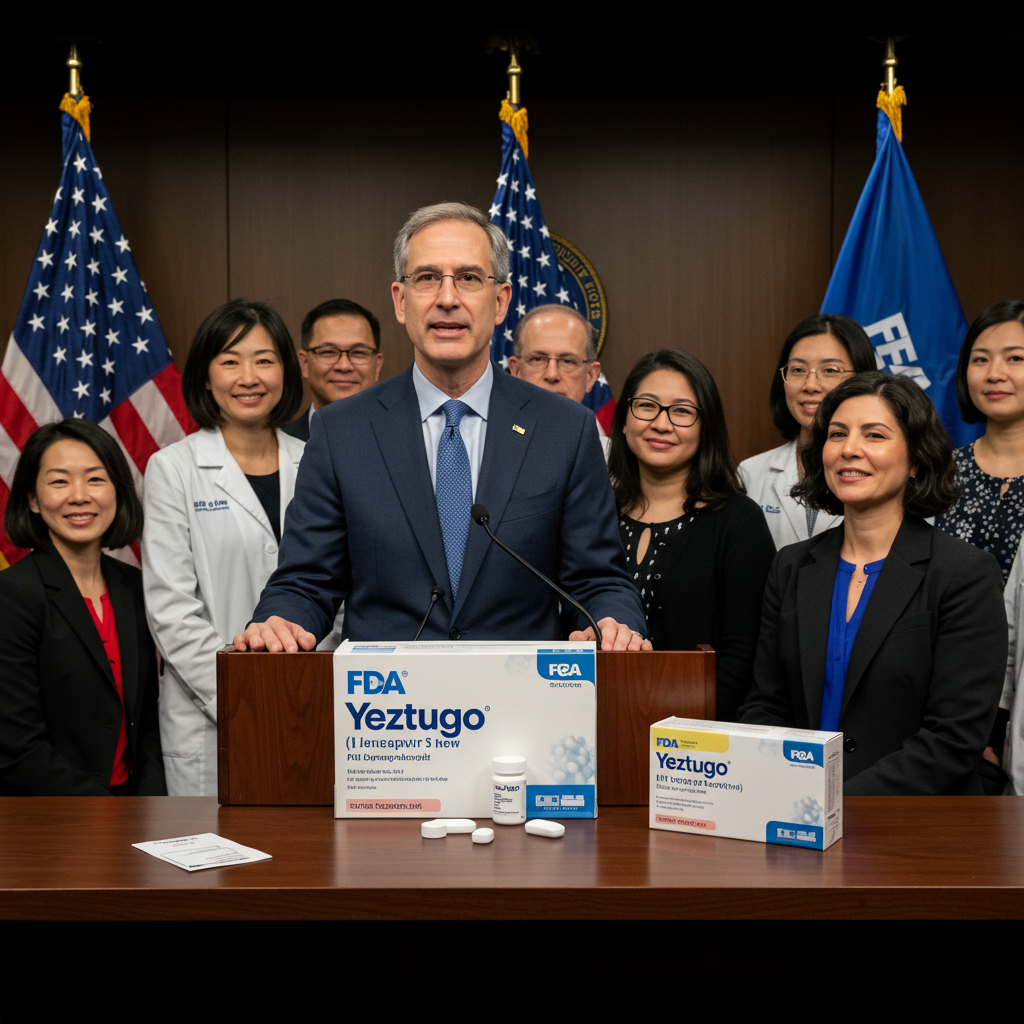Today marks a pivotal moment in the ongoing global effort to end the HIV epidemic. The U.S. Food and Drug Administration (FDA) has approved Yeztugo (lenacapavir), Gilead Sciences’ innovative medicine for HIV prevention, also known as pre-exposure prophylaxis (PrEP). This breakthrough treatment, hailed by public health experts, made significant global headlines following the announcement of its clinical trial results.
Yeztugo stands out as the first and only PrEP medication administered just twice a year via subcutaneous injection. This infrequent dosing schedule represents a major advancement, as prevention is only truly effective when individuals can realistically integrate it into their lives. The convenience of twice-yearly dosing, coupled with compelling clinical data, positions Yeztugo to potentially transform the landscape of HIV prevention.
The journey to this approval began nearly two decades ago, rooted in Gilead scientists’ exploration of targeting the HIV capsid to develop novel, improved therapies. This rigorous process involved screening over 4,000 molecules to identify the compound that became lenacapavir. It is the dedication and perseverance of these teams that have brought this significant goal of helping to end the HIV epidemic closer to reality.
With a long career in the biopharma industry, the profound sense of possibility that Yeztugo brings is unparalleled. Reflecting on the past, HIV was often a death sentence 30 years ago. While tremendous progress has been made since then, the fight against HIV is far from over. The epidemic continues to impact communities worldwide.
Approximately 1.3 million people globally acquire HIV each year. Contrary to outdated perceptions, HIV affects individuals across all demographics. In many regions, the incidence is unfortunately rising fastest among women and adolescent girls. In the United States alone, 1.2 million people live with HIV, and sadly, 100 people die from HIV-related illness and over 700 are newly diagnosed every week.
Ensuring Access and Driving Impact
Introducing Yeztugo provides a critical opportunity to change the trajectory of the epidemic. However, achieving this goal requires more than just scientific innovation; it demands ensuring this breakthrough medicine reaches the individuals and communities who need it most. For Gilead, access has been as central a focus as the science itself, informed by extensive input from stakeholders in the HIV field.
Gilead has a long-standing legacy in virology and a deep commitment to helping end the HIV epidemic, including developing long-acting prevention options like Yeztugo. This commitment is demonstrated by the fact that roughly 75% of people living with HIV globally are on a treatment regimen innovated by Gilead, with 16.5 million people in low- and middle-income countries having access to Gilead-innovated therapies.
Recognizing that overcoming HIV involves more than medication, Gilead actively supports over 2,000 organizations addressing crucial non-treatment factors like stigma, discrimination, and health disparities. Access strategies for Yeztugo reflect this comprehensive approach:
Global Access: Even before the initial regulatory filing, Gilead licensed lenacapavir to generics manufacturers to facilitate the availability of generic versions in 120 primarily low- and lower-middle-income countries once approved. To bridge the gap until generics are widely available, Gilead is collaborating with global aid organizations to provide branded Yeztugo at no profit for at least 2 million people over three years. Tailored strategies, including tiered pricing and public-private partnerships, are also in place for middle-income countries.
U.S. Access: In the United States, programs are in place to help eligible uninsured individuals access Yeztugo through patient assistance. For those with commercial insurance, steps have been taken to help with copayments.
Community Engagement: Beyond drug access, Gilead engages in partnerships to address specific challenges and empower communities, from initiatives aimed at cultivating empathy within faith communities to supporting projects that leverage trusted local figures for HIV education or empower specific affected groups like the transgender community. Campaigns like “Fearless for All” also highlight individuals courageously working to reduce stigma and disparities.
Furthermore, realizing the full potential of Yeztugo requires supportive government policies and sustained funding for comprehensive HIV services, including essential testing, linkage to care, and surveillance programs. Gilead, alongside many others, is actively engaging with policymakers to emphasize the critical need for continued support.
A Collective Achievement
Reaching this point has been a monumental undertaking, extending far beyond the discovery and development efforts at Gilead Sciences. This achievement is shared with a vast network of collaborators. Enormous gratitude is owed to global community accountability groups, HIV community organizations, dedicated advocates, public health leaders, the courageous individuals who participated in the clinical trials, and countless others united by the commitment to ending the HIV epidemic. Scientists who have dedicated their careers to HIV research and treatment also share in this milestone, as every prior advance has laid the foundation for this significant leap forward in innovation.
Ultimately, the collective focus is on translating the innovation of Yeztugo into real-world impact. By meeting this moment with the attention and resources it deserves, we can foster a future where individuals are free from the fear of acquiring HIV. There is great hope that this approval will be looked back upon as the inflection point in the ongoing effort to end the HIV epidemic.
U.S. Indication and Important Safety Information for Yeztugo for HIV Prevention, Including Boxed Warning
Please review the following essential information:
Indication: Yeztugo (lenacapavir) injection, 463.5 mg/1.5 mL, is indicated for pre-exposure prophylaxis (PrEP) to reduce the risk of sexually acquired HIV-1 in adults and adolescents (>35kg) who are at risk for HIV-1 acquisition.
Prior to Use: Individuals must have a negative HIV-1 test prior to initiating Yeztugo.
BOXED WARNING: RISK OF DRUG RESISTANCE WITH USE OF YEZTUGO IN UNDIAGNOSED HIV-1 INFECTION
Individuals must be tested for HIV-1 infection prior to initiating Yeztugo, and with each subsequent injection, using an FDA-approved or cleared test for the diagnosis of acute or primary HIV-1 infection.
Drug-resistant HIV-1 variants have been identified when Yeztugo was used by individuals with undiagnosed HIV-1 infection. Do not initiate Yeztugo unless negative infection status is confirmed.
Individuals who acquire HIV-1 while receiving Yeztugo must transition immediately to a complete HIV-1 treatment regimen.
Contraindications: Yeztugo is contraindicated in individuals with unknown or positive HIV-1 status.
Comprehensive Prevention: Use Yeztugo as part of a comprehensive prevention strategy. This includes strict adherence to the administration schedule and using safer sex practices, including condoms, to reduce the risk of sexually transmitted infections (STIs).
HIV-1 Acquisition Risk Factors: Consider behavioral, biological, or epidemiologic factors such as condomless sex, history of STIs, self-identified HIV risk, having partners of unknown HIV-1 status, or sexual activity in high-prevalence areas/networks. Counsel individuals on using other prevention methods as appropriate.
Resistance Risk: There is a potential risk of developing resistance if an individual acquires HIV-1 before, while receiving, or following discontinuation of Yeztugo. HIV-1 resistance substitutions may emerge if individuals with undiagnosed infection take only Yeztugo, as it is not a complete treatment regimen. Rigorous testing before each injection is essential to minimize this risk.
Long-Acting Properties & Risks: Residual concentrations of Yeztugo may remain in circulation for up to 12 months or longer after the last injection. It is crucial to select individuals who agree to the required dosing schedule, as nonadherence or missed doses could lead to HIV-1 acquisition and development of resistance.
Serious Injection Site Reactions: Yeztugo must only be administered subcutaneously. Improper administration (intradermal) has been linked to serious injection site reactions, including necrosis and ulceration.
Most Common Adverse Reactions: In clinical trials, the most common adverse reactions (≥5%) were injection site reactions, headache, and nausea.
Drug Interactions: Strong or moderate CYP3A inducers may significantly decrease Yeztugo concentrations; dosage modifications are recommended when initiating these. Coadministration with combined P-gp, UGT1A1, and strong CYP3A inhibitors is not recommended. Yeztugo may also increase concentrations of certain other drugs.
Dosage Information: Yeztugo involves an initiation phase (injections and tablets) followed by continuation with a once-every-6-months injection.
Initiation: Day 1: 927 mg subcutaneous injection (2 x 1.5-mL injections) and 600 mg orally (2 x 300-mg tablets). Day 2: 600 mg orally.
Continuation: 927 mg subcutaneous injection every 6 months (26 weeks) from the date of the last injection (±2 weeks).
Anticipated Delayed Injections: If the scheduled 6-month injection is expected to be delayed by more than 2 weeks, Yeztugo tablets (300 mg orally once every 7 days) may be taken on an interim basis for up to 6 months until injections resume. Resume continuation injections within 7 days of the last oral dose.
Missed Injections: If more than 28 weeks have passed since the last injection and tablets were not taken, restart with initiation dosing if clinically appropriate.
Consult the full Prescribing Information, including the Boxed Warning, for complete details on usage, dosage modifications, and safety.


